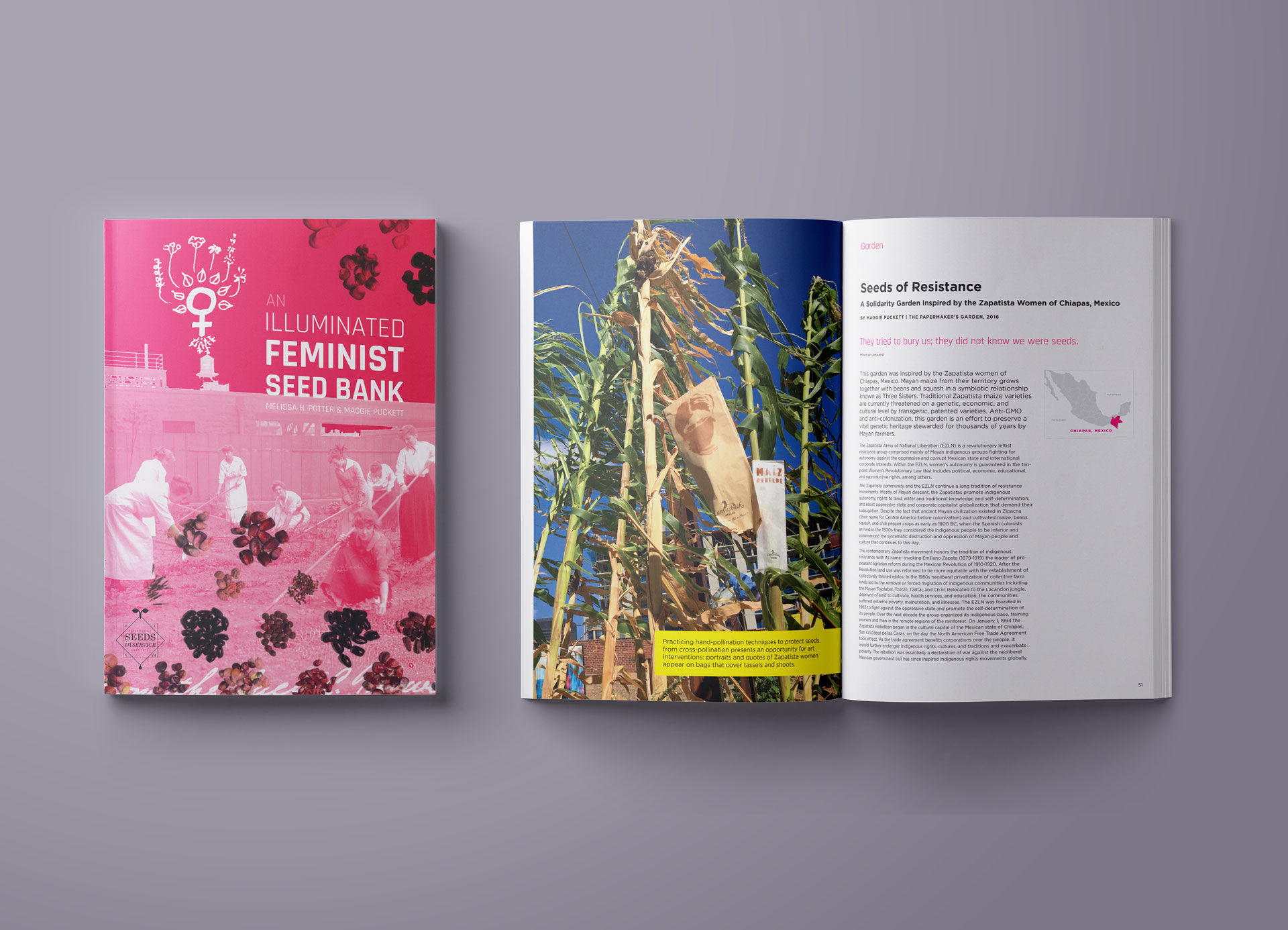
Maggie Puckett & Melissa Potter’s book, An Illuminated Feminist Seed Bank.
I first met Maggie Puckett 23 years ago in our freshman drawing class at NYU where we were partnered for an assignment. From that moment on she has never ceased to amaze me with her whimsical and thought-provoking artworks which I have delighted in following and supporting ever since. Maggie’s dynamic and socially engaged practice has grown over the years from painting and drawing to printmaking and artist books to papermaking and urban gardening and currently ceramics. Regardless of the material, media or technique, Maggie’s voice is strong and consistent across her oeuvre.
With a focus on the natural world, where art meets science, Maggie’s subject matter is grounded in ecofeminism and the Anthropocene Epoch. Growing up in Southern California, Maggie’s initial interest in Marine Biology informed the trajectory of her work for decades to come. Over time, her exploration of sea life expanded into alternate earth systems with a growing emphasis on the effects of climate change and humans’ impact on Earth’s geology and ecosystems.
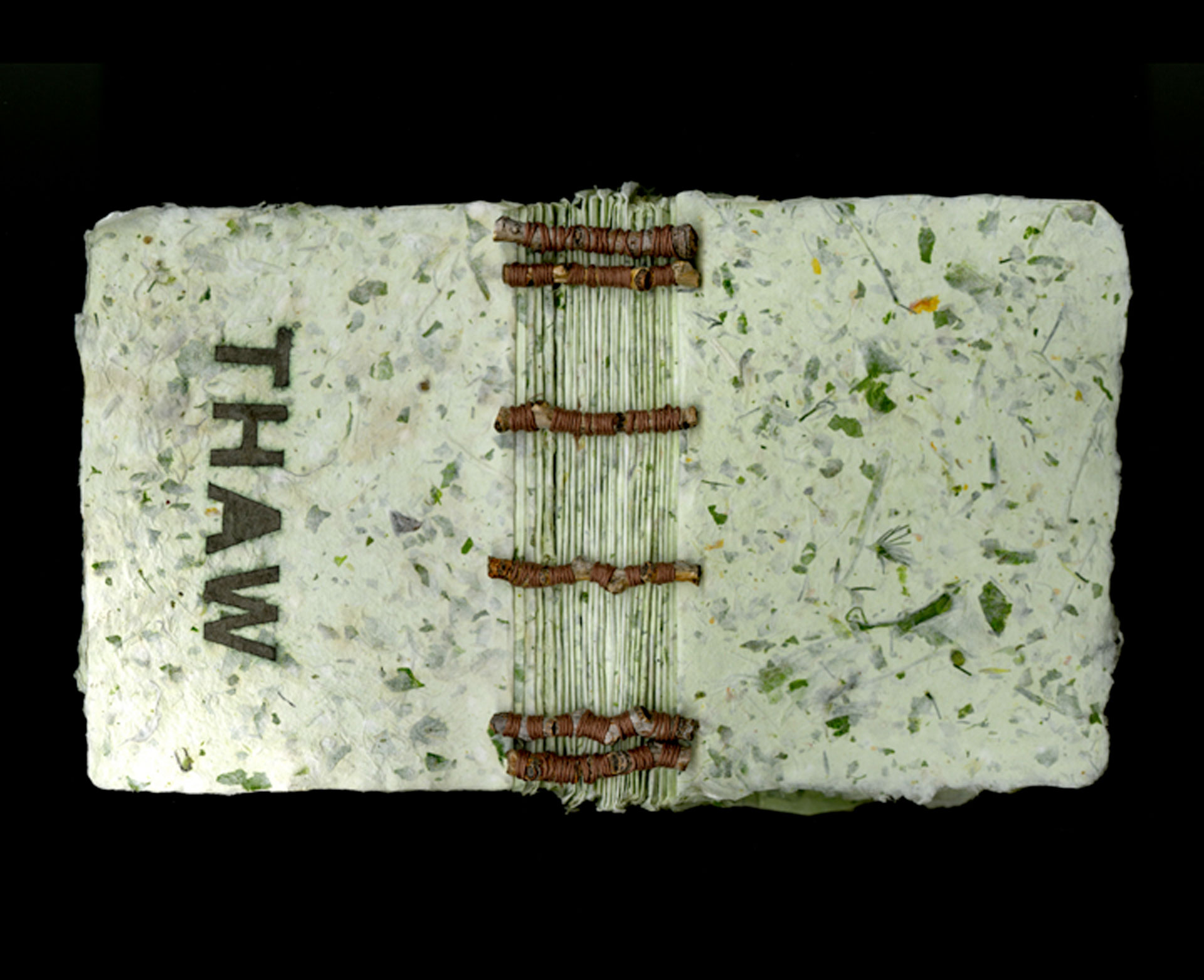
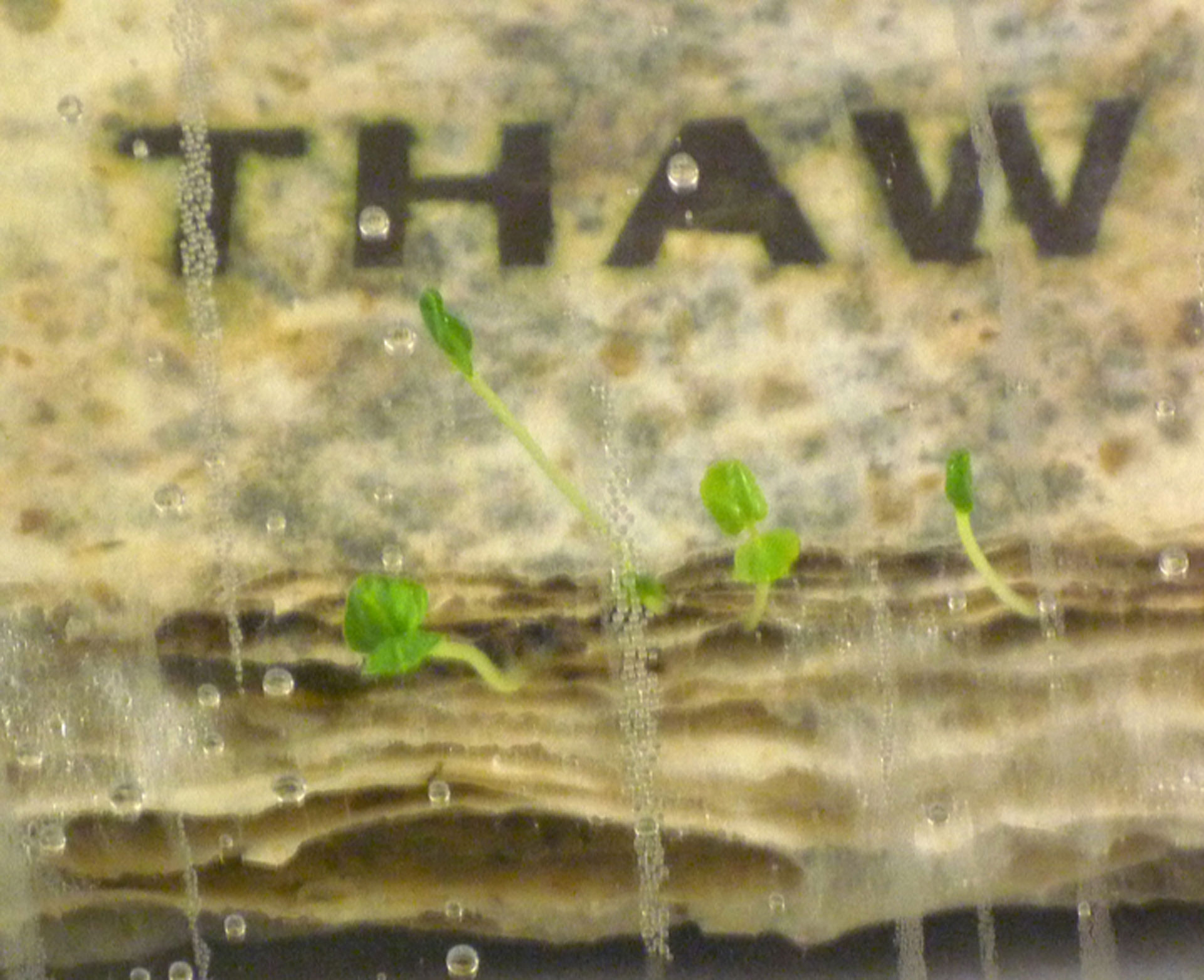
Maggie Puckett, Anthropocene Thaw.
One such example of this work is “Thaw”, an artist book inspired by thawing polar permafrost and constructed from cotton paper containing raw, unprocessed vegetation (greens, flowers, and seeds from squash, tomato, peppers and dill). “Thaw” was assembled in the fall of 2010, waterlogged, frozen for the duration of winter, and allowed to thaw and biodegrade in a clear plastic box throughout the spring of 2011. After the book had sufficiently thawed it began to mold and sprout, simultaneously decaying and growing, using natural processes to explore themes of loss of the old world and hope for the new one.
Within her research Maggie began to study Carolyn Merchant’s theory that the scientific revolution enabled both the exploitation of nature and the subjugation of women; and Silvia Federici’s theory that the rise of capitalism in early modern Europe required a genocidal war against women in the form of witch hunts. These ties between the patriarchal policing of women and the destruction of the environment form the basis of Maggie’s work. Her study of this history helps her to ask the questions, how can artists use their practice to solve problems, what can we do to change things?
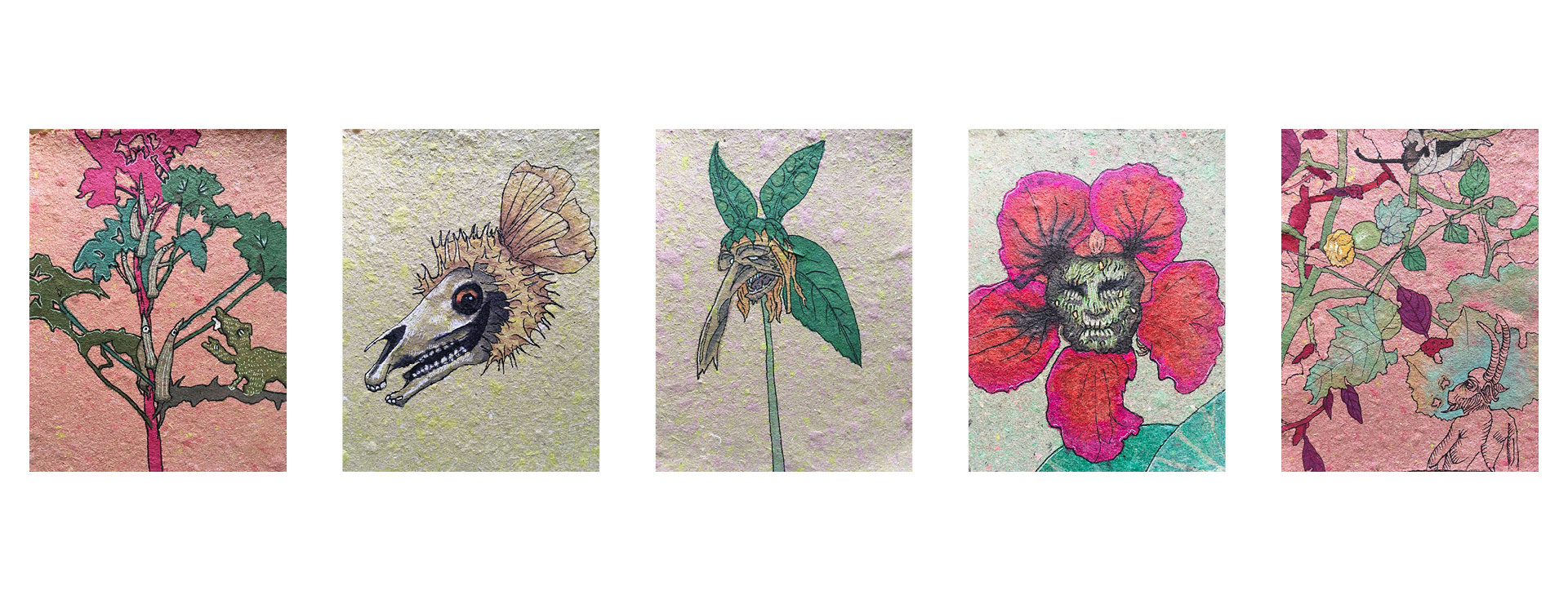
Maggie Puckett, Five Field Demons.
Simultaneously, Maggie finds inspiration in medieval and religious art works, some of her biggest influences being Heironymous Bosch, Francisco Goya and Pieter Bruegel. Bosch’s depictions of surreal creatures blending humans and animals combined with Bruegel’s exploration of morality vs immorality and Goya’s graphic etchings are evident throughout her works. Religion, particularly Catholic and Protestant institutions, played a big part in controlling the arts through its funding, adding to the patriarchal agenda.
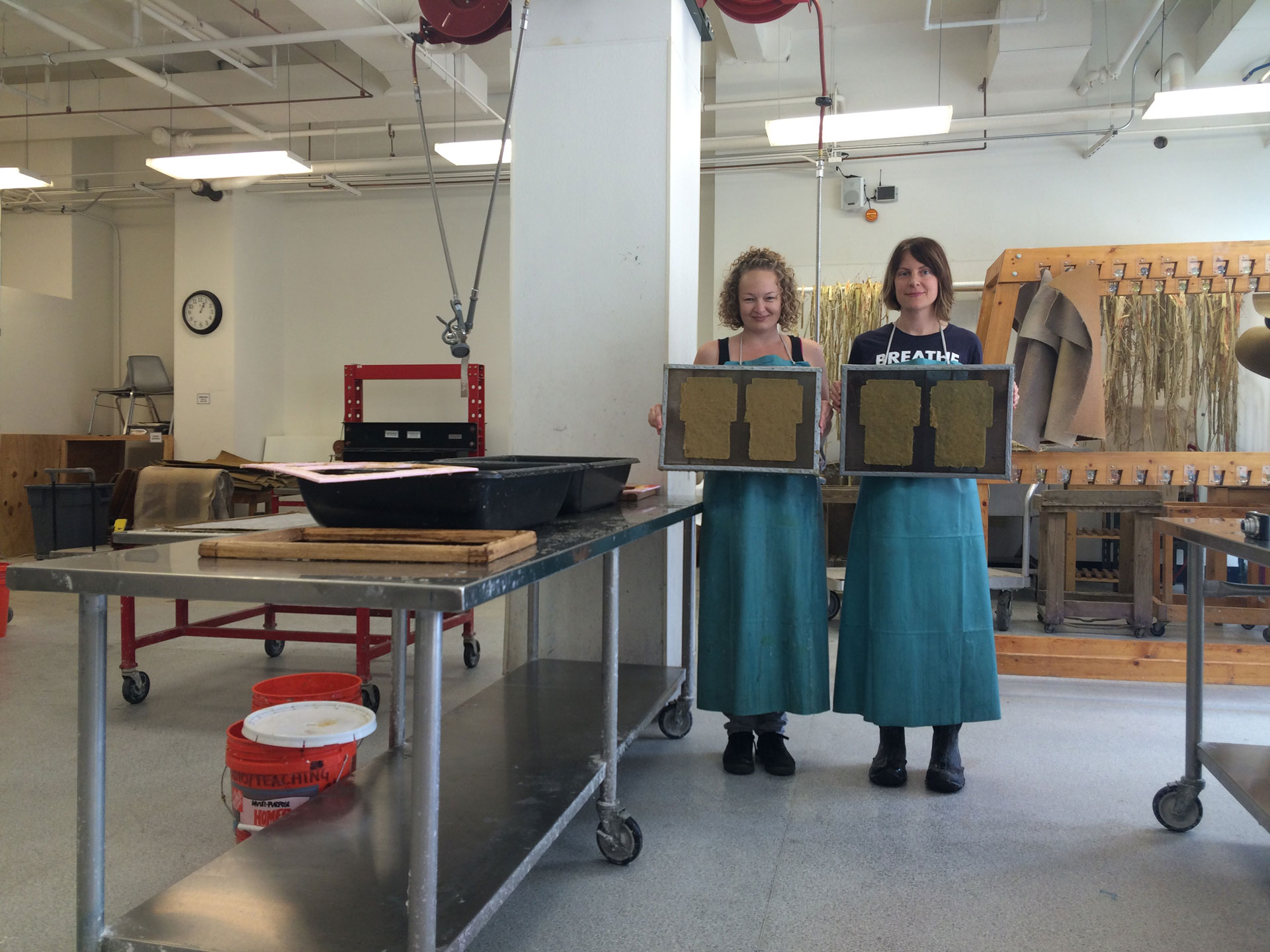
Maggie Puckett & Melissa Potter making paper seed packets with homegrown corn stalk fiber.
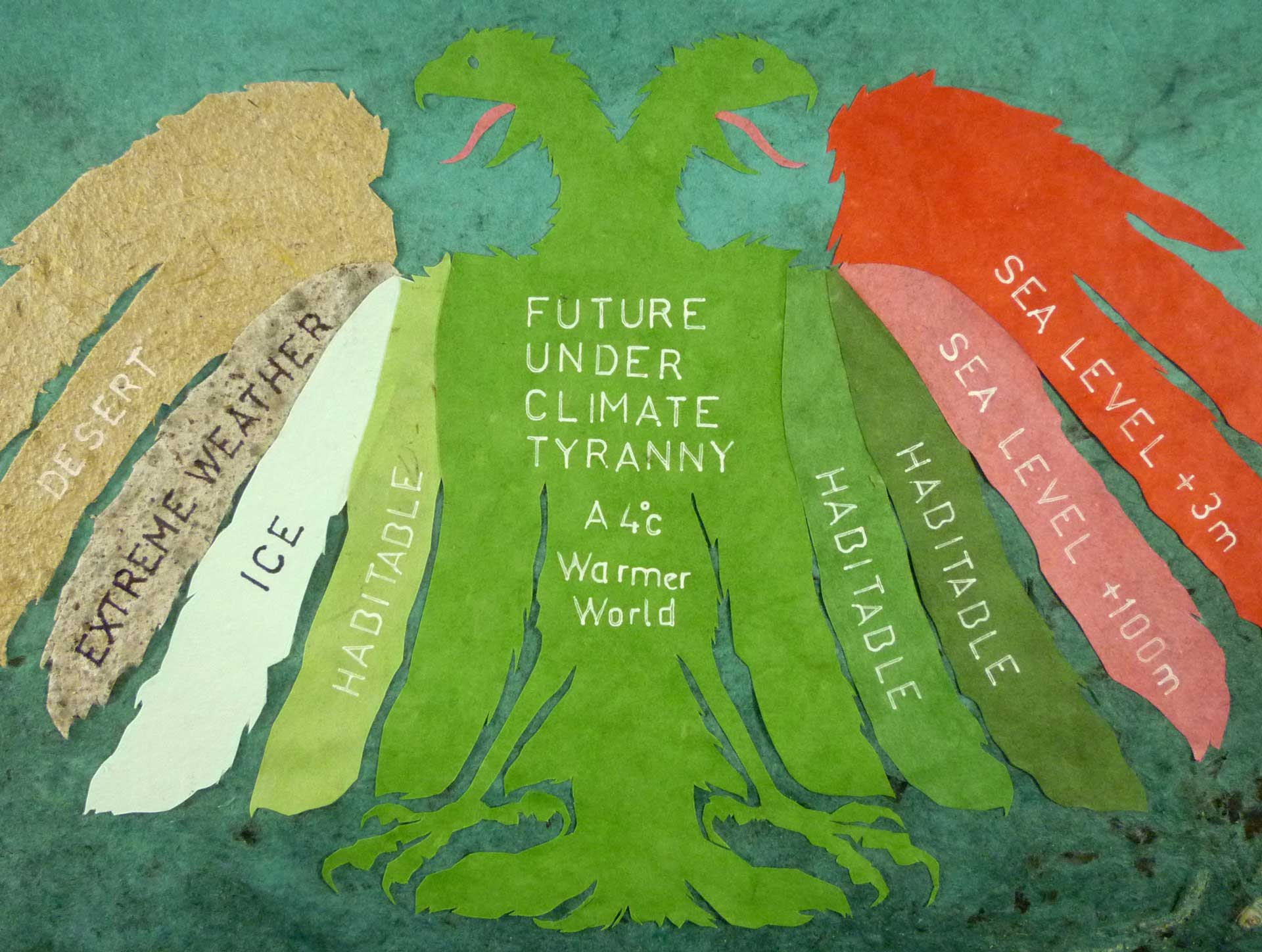
Maggie Puckett, Anthropocene, Future Under Climate Tyranny (F.U.C.T.).
Maggie has explored these themes of nature, feminism, morality, censorship and ecological destruction first through her paintings and drawings and subsequently through her printmaking and artist books at NYU under the tutelage of Carson Fox. Graduate school at Columbia College’s Center for Book and Paper Art’s in Chicago introduced her to letterpress and papermaking with Melissa H. Potter with whom she collaborated to develop a papermaking garden. Together they created Seeds InService, a program that curates pedagogical gardens with ecological and feminist themes, provides mobile papermaking opportunities for the community, and employs guerrilla tactics to disseminate ecological information through seed packets from their garden and seed bombs to spread the growth of plants in public spaces.
Taking a holistic approach, these different practices often converge in Maggie’s work. She constructs artist books from handmade paper cultivated from the seed’s in her papermakers garden; casts handmade paper masks and then buries them in the garden to sprout new growth; creates printing plates of images of heresy which she repurposes to emboss ceramic vessels. Her work is often dictated by the tools and materials she has available to her, working on a smaller scale when limited. Access to new techniques and equipment throughout her studies have broadened her scope of technical abilities to further express her ideas. For the past year Maggie has taken ceramic classes at Penguin Foot Pottery in Chicago where she resides. This move to three dimensional work has fueled her creativity and imagination further exploring folkloric ideas around the changing seasons and the beginning of Advent, a time to prepare for winter solstice celebrations.

Top left image: Maggie Puckett, Poster for the Witchcraft And Colonial Warfare garden. Top right image: Maggie Puckett, Battle of Fröyhall: Seed Hags Defending the Seed Vault. Image bellow: Maggie Puckett, Witches Pharmacopoeia, Elf Dock.
Following graduate school Maggie participated in several artist residencies that pushed her practices to new levels. In 2011 she took part in a residency in Caracas, Venezuela where she and a group of local artists worked with a member of the Yanomami tribe to create paper that culminated in a book inspired by their creation mythology. In 2019 Maggie traveled to Svalbard in the Arctic with a group of international artists to place her and Melissa’s book An Illuminated Feminist Seed Bank and other seed and plant related artworks in the mountain that houses the Global Seed Vault. And most recently, in 2022, Maggie partook in an exchange through the Women’s Studio Workshop to go to Malmö, Sweden to work in their letterpress facilities. Here she used photopolymer plates which included images culled from 15th and 16th century witch-hunting pamphlets including witches, snakes, bats, and demons, along with agricultural related iconography to create a collection of handbound artist’s books/seed packets and prints on handmade paper.
In 2023, Future Under Climate Tyranny (F.U.C.T.) A 4°C Warmer World (2011), was on view at Smith College Museum of Art. A collage of handmade paper (abaca, cotton, flax, wheat straw, beach and desert sand, soil, marine plastic, dried anchovies, dried shrimp, feather boa, seaweed, dried garden plants, vegetable seeds) and pigment, imagines a map of the world if global temperatures were to warm by 4°C, inverting the traditional Mercator projection in order to disorient the viewer. As part of the Museum’s permanent collection, this piece is available to be viewed upon request.
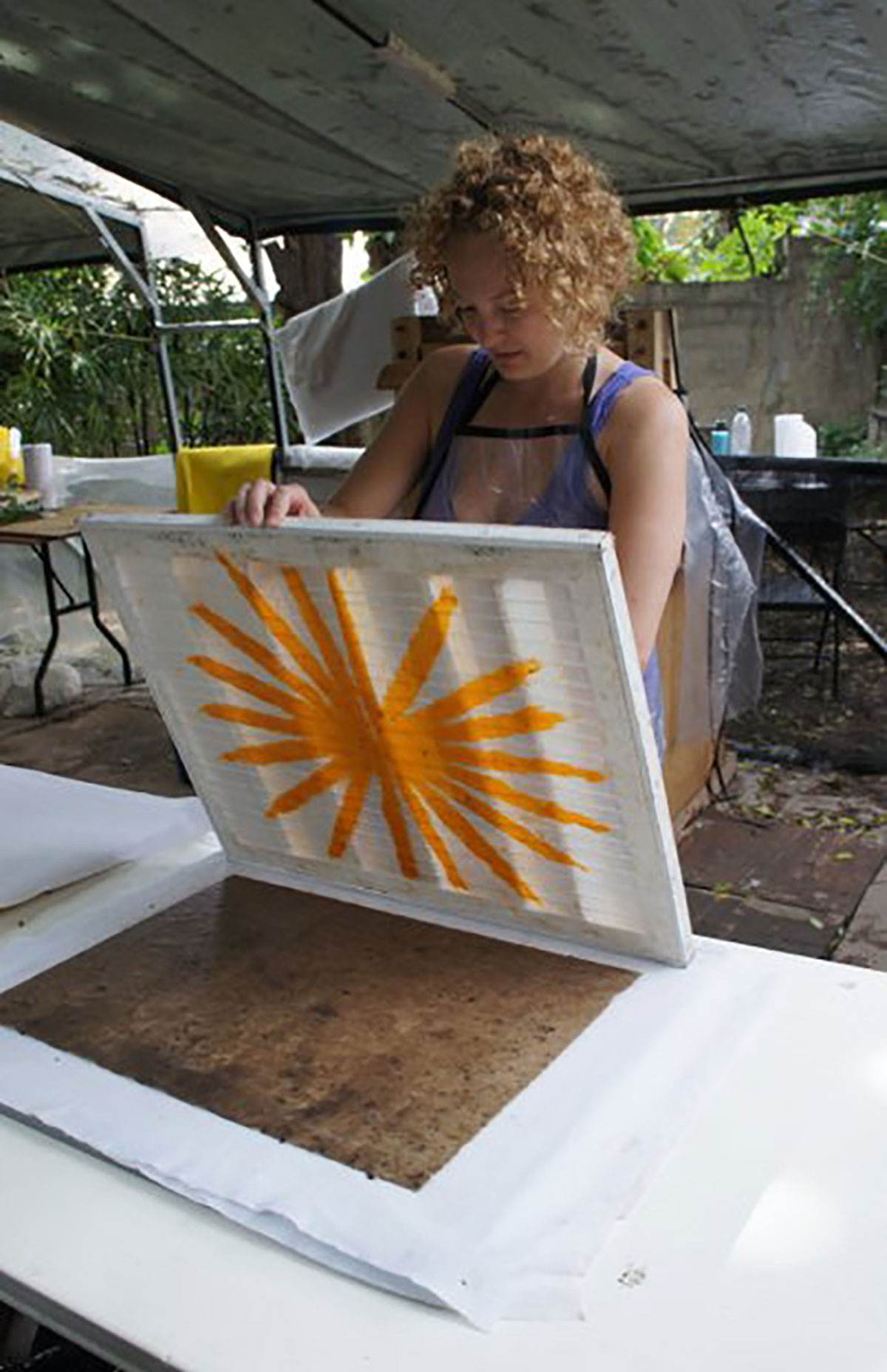
Maggie Puckett in Residence in Caracas, 2011
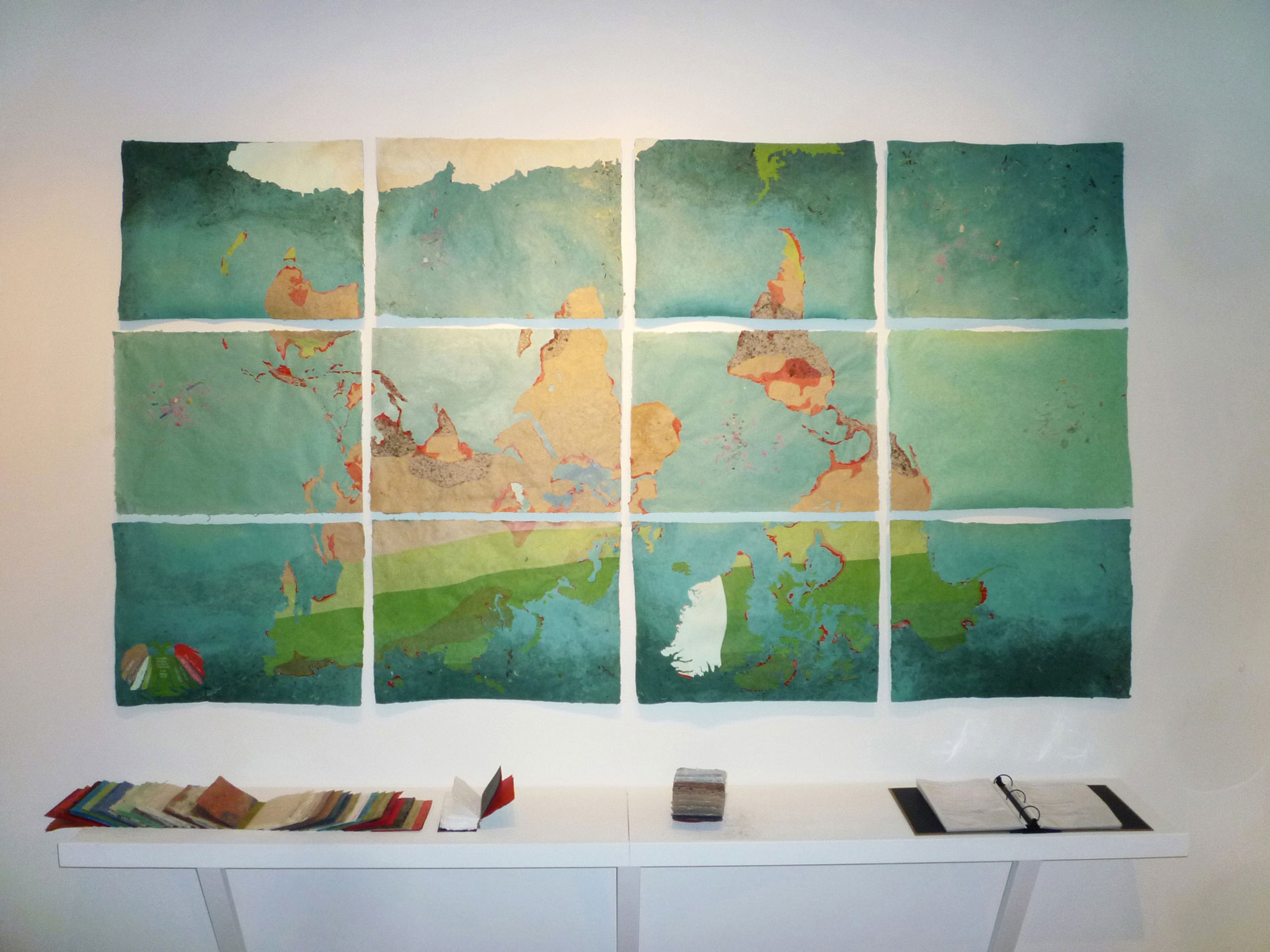
Maggie Puckett, Anthropocene, Future Under Climate Tyranny (F.U.C.T.).
A dynamic artist, versatile in her use of materials which not only explores personal expression but also societal reflection and environmental advocacy, Maggie’s work resonates with the understanding that patriarchal structures not only subjugate women but also contribute significantly to the degradation of our environment. Her work highlights the cyclical relationship between the exploitation of both women and nature, perpetuating a harmful cycle of control, suppression and degradation, a vivid portrayal of societal narratives.
Hayley Ferber is a contemporary arts facilitator, curator, educator and artist living in Brooklyn, NY. In her current role as Operations Director at The Clemente Soto Vélez Cultural & Educational Center and previous role as Deputy Director of Chashama, she supports a creative community of multidisciplinary artists. Independently, she has curated exhibitions for The Clemente Center, Residency Unlimited, Equity Gallery, New York Artists Circle, Robert Berry Gallery, and the Yard: Williamsburg, among others. As a visiting curator, Hayley has worked with artists from Residency Unlimited, ISCP, the NARS Foundation, Kunstraum LLC and ChaNorth, and has served as guest juror for NYSCA, the DCLA, Brooklyn Arts Council, and Queens Council on the Arts. Hayley’s personal artistic practice explores nautical themes through artist books and printmaking. She has exhibited her work at the Kalamazoo Book Art Center, Equity Gallery, Chashama, the Pelham Art Center, 440 Gallery, 92NY and Aqua Art Miami among others. Hayley loves sharing her artistic passions and practices with her students and has taught workshops for the Swiss Institute, Lower Manhattan Cultural Council, Brooklyn Public Library, Pelham Art Center and Gallery North. She was a resident artist at ChaNorth in 2021 and received her MAT in Art & Design Education from RISD and BS in Studio Art from NYU. www.hayleyferber.com, @hayleyferber
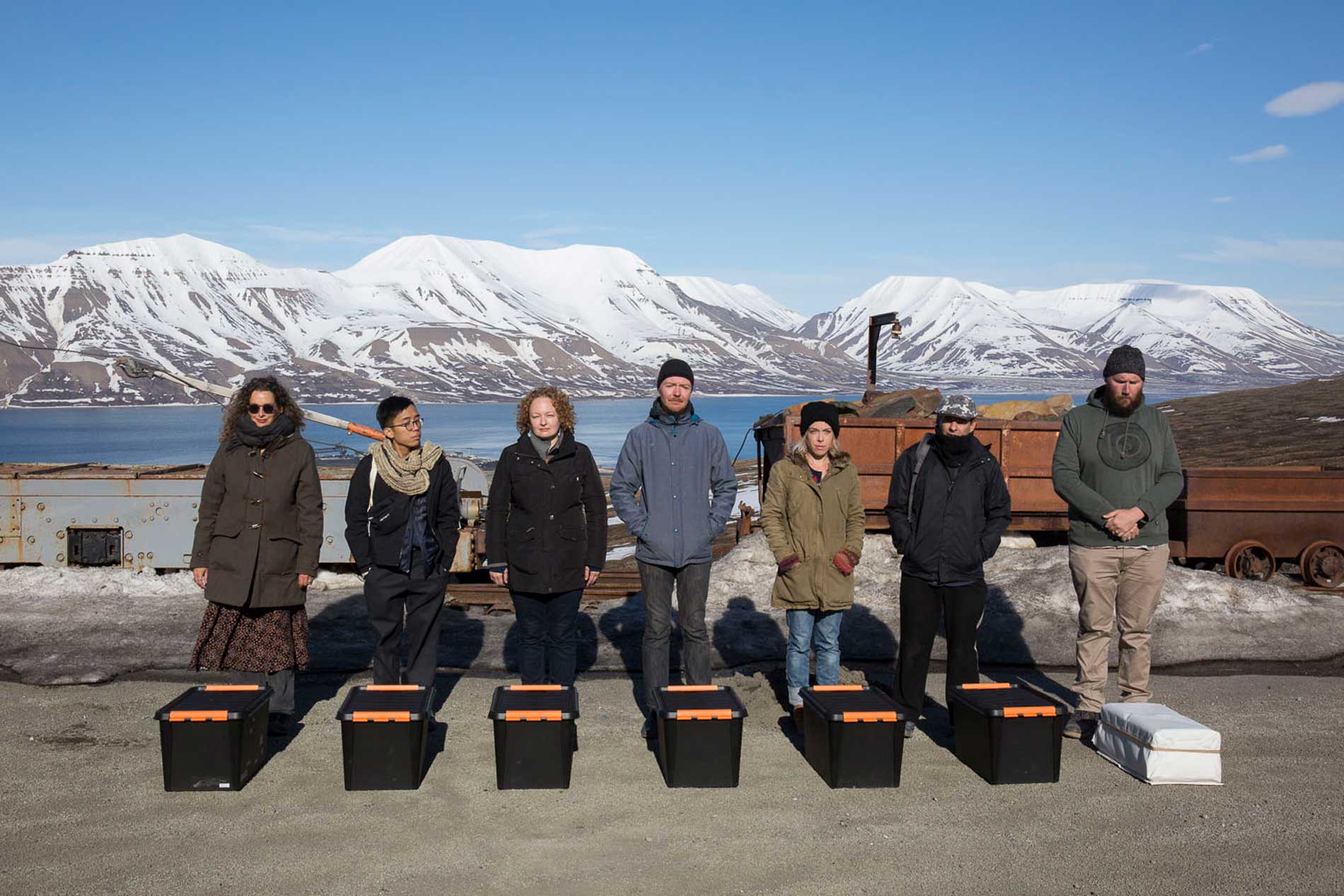
Maggie Puckett and crew, Svalbard Seed Cultures Ark Deposit, 2019, Svalbard.
In 2022 Puckett was an artist in residence at KKV Grafik Studio and Sculpture Workshop Monumental in Malmö, Sweden, where she produced her “Ecofeminist Seed Library: Resisting Patriarchy and Climate Collapse through Art and Ecological Biodiversity”. As part of the 2019 Agri/Cultures.Seed-Links Exhibition: Conserving Cultural Connections with Seeds, a collection of artworks from her collaborative project Seeds InService was interred in a frozen mountain high in the Arctic Circle, next to the Global Seed Vault in Svalbard, Norway. Seeds InService received a MAKER Grant from Chicago Artists Coalition and Other People’s Pixels, and a matching grant with 3Arts Projects. In a month-long residency in Caracas, Venezuela, Puckett collaborated with local artists and a member of the Yanomami tribe making paper from local fibers and an edition of artist’s books about a Yanomami creation myth.
Puckett has exhibited widely including at EXPO Chicago, MCA Chicago, Hyde Park Art Center, Johnson Museum of Art, Cornell University (Ithaca, NY), Smith College Museum of Art (Northampton, MA), Cambridge Art Association (Cambridge, MA), Paul Robeson Galleries, Rutgers University (NJ), and The Center for Book, Paper, and Print (Columbia College Chicago).
Her work is in the permanent collections of Dartmouth College, Occidental College, Savannah College of Art and Design, Smith College Museum of Art, St. Ambrose University, and UC Santa Barbara.
Born in Southern California, Maggie Puckett currently lives and works in Chicago. She holds a BS in Studio Art from New York University and an MFA in Interdisciplinary Art from Columbia College Chicago.
To know more about Maggie: www.maggiepuckett.com /@






